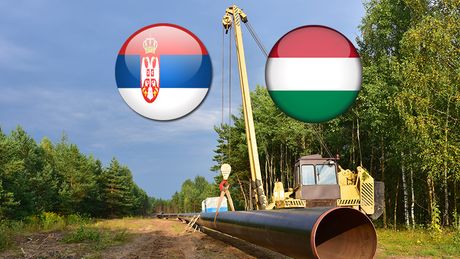30 years ago, Serbia was paying dearly for gas supplied via Hungary, but the tables have now turned

Hungary was still receiving gas via Ukraine today, but it is not yet known thanks to which company. This has calmed the tension that started in the previous days.
The energy crisis has spread over the whole world, but Serbia seems to have got a chance to earn something from it. Specifically, at the moment, Serbia can charge the transit of Russian gas to the Hungarians - and it used to be the other way around.
The Secretary General of the Gas Association of Serbia, Vojislav Vuletic, tells Telegraf Biznis that geopolitics has pushed the price of gas high, and that it will depend on the skills of the players on the market who will be left in the cold this winter.
But what is currently happening with gas?
European natural gas prices are have hit above record $1,000 per 1,000 cubic meters. Experts expect gas prices to continue to rise and break new records unless the current shortage of goods on the European market is not curbed ahead of the coming winter.
Analysts attribute the rise in prices to a post-pandemic increase in demand for natural gas combined with gas storage facilities in Europe not being sufficiently filled up.
According to the authorities, Serbia avoided a serious crisis with a historic agreement with the Russians, and finally gas started flowing through a 400-kilometer pipeline through our country. Thus, Serbia has become a transit country for Russian gas.
What about the Hungarians?
Russia's Gazprom, according to a long-term gas supply agreement with Budapest that took effect on Friday, now supplies gas to Hungary via Serbia and Austria, instead of via Ukraine. Hungary's FGSZ confirmed that a new interconnector was put into operation on the pipeline in Serbia on October 1.
The FGSZ stated that, in addition to Gazprom, dozens of companies deliver gas to Hungary via various routes, one of which is the Ukrainian gas pipeline.
Dissatisfaction with the new Hungarian gas agreement with Gazprom has spilled over into a bilateral dispute between Kiev and Budapest, whose relations have already been strained over the use of the Hungarian language in Ukrainian schools.
How can Serbia profit?

Hungary is a huge consumer of gas, while our country imports less. We used to pay dearly for transit through Hungary, while now the question becomes how much we charge them?
"When we previously negotiated the price of gas via Hungary, and that was a long time ago, 30 years ago, the Soviet Union as well as the Warsaw Pact still existed. Hungary was in a similar situation as we are now. Then, our side agreed on the price with the Hungarians and a higher price was allowed than would be normal, since it was calculated at the time," Vuletic tells our portal.
As he stressed, however, today things have changed, and additionally, Serbia is now directly negotiating the price with Hungary, rather than through intermediaries or third parties.
"The (transit fee) price per 1,000 cubic meters is around 3 dollars, I believe we will charge that. Earlier, other conditions were in effect, but now they are market-based and more fair than before," Vuletic added.
According to him, the situation is favorable for our country.
"Remember a few years ago when Ukraine stopped the gas transit on a whim, and Europe was left without gas - we had to manage and buy gas at abnormal prices from various storage stations. Why would we now be tied to someone who is unpredictable if we have our own gas pipeline that is new, good, modern and we do not depend on anybody," Vuletic asked.
Why does price of gas keep increasing?
Speaking about high gas prices on the stock exchanges, Vuletic said that gas is a commodity that is currently in the focus of politicians, but also in short supply.
"Gas is geopolitics, so that is the biggest factor behind gas reaching such a high price," says our interlocutor.
As a reminder, the long-term contract concluded between Srbijagas, Serbia's state gas enterprise, and Russia's Gazprom envisages the purchase price of gas for Serbia of 260 dollars per 1,000 cubic meters. The retail price of natural gas in Serbia for households at the moment is around 37 dinars (30 euro cents) per cubic meter.
Video: Run, Bajatovic! Vucic orders the director of Srbijagas to run over to him, to quiz him about the price of gas pipeline
(Telegraf Biznis)
Video: Poljski novinar se javio za reč posle derbija, postavio pitanje na srpskom i nasmejao trenera
Telegraf.rs zadržava sva prava nad sadržajem. Za preuzimanje sadržaja pogledajte uputstva na stranici Uslovi korišćenja.

